
Lancet Microbe
Scope & Guideline
Elevating the Standards of Microbial Science
Introduction
Aims and Scopes
- Infectious Disease Epidemiology:
The journal publishes research that investigates the patterns, causes, and effects of infectious diseases in populations, utilizing statistical models and epidemiological frameworks. - Microbial Genomics:
There is a significant focus on genomic studies that explore the genetic basis of pathogen virulence, antibiotic resistance, and the evolution of microbial populations. - Antimicrobial Resistance (AMR) Studies:
Lancet Microbe places a strong emphasis on research related to the emergence and spread of antimicrobial resistance, including surveillance studies and the development of novel therapeutic strategies. - One Health Approach:
The journal promotes interdisciplinary research that connects human, animal, and environmental health, highlighting the interconnectedness of infectious disease dynamics. - Innovative Diagnostic Techniques:
Research on new diagnostic methods, including molecular and genomic techniques, is a core area, aiming to improve the detection and management of infectious diseases. - Clinical Trials and Therapeutics:
The journal features studies assessing the efficacy and safety of vaccines and therapeutics for various infectious diseases, particularly in response to emerging health threats.
Trending and Emerging
- COVID-19 Research:
Research related to COVID-19 remains a dominant theme, with a focus on vaccine efficacy, long-term effects, and the dynamics of variants, as the pandemic continues to influence public health priorities. - Microbiome Studies:
There is a growing interest in the role of the microbiome in health and disease, particularly its interaction with infectious agents and its impact on treatment outcomes. - Zoonotic Disease Surveillance:
Studies addressing zoonotic diseases, particularly in the context of environmental changes and human-animal interactions, are increasingly prevalent, reflecting concerns over emerging infectious diseases. - Antimicrobial Stewardship Programs:
Research focused on strategies for optimizing antimicrobial use and combating resistance through stewardship initiatives is gaining traction, highlighting the need for responsible antibiotic usage. - Global Health Equity and Access to Care:
Emerging themes emphasize the importance of equitable access to healthcare and vaccines, particularly in low- and middle-income countries, as part of a comprehensive response to infectious diseases.
Declining or Waning
- Traditional Antibiotic Development:
Research specifically focused on traditional antibiotic development seems to be waning, possibly due to a growing emphasis on alternative therapies and the need for more innovative approaches to combat antibiotic resistance. - Single Pathogen Studies:
There is a noticeable decline in studies focusing solely on individual pathogens without considering broader microbial interactions or community dynamics, indicating a shift towards more holistic approaches. - Non-Genomic Surveillance Techniques:
As genomic technologies and molecular techniques gain prominence, traditional surveillance methods that do not incorporate genomic data are becoming less frequently reported in the literature. - In-depth Studies on Established Vaccines:
Research centered on well-established vaccines is less prevalent, as there is a greater focus on novel vaccine development and the response to emerging pathogens.
Similar Journals

New Microbes and New Infections
Pioneering research on emerging microbes and infections.New Microbes and New Infections is an esteemed peer-reviewed journal published by Elsevier Sci Ltd that has been a prominent platform for disseminating groundbreaking research in the fields of Infectious Diseases and Microbiology since its establishment in 2013. With an impressive Open Access model, this journal ensures that vital research findings are readily accessible to researchers, healthcare professionals, and academics worldwide. Positioned in the Q2 category for Infectious Diseases and Q3 for Microbiology in 2023, it reaches a significant global audience, as demonstrated by its high Scopus rankings—#44 out of 344 in Medicine: Infectious Diseases, and #34 out of 182 in Immunology and Microbiology. The journal aims to inspire new ideas and foster collaborations by publishing high-quality research focused on novel microbes and infections, thus playing a crucial role in advancing science and public health in an era where understanding infectious agents is more vital than ever.
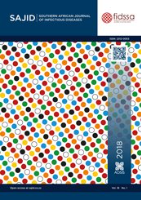
Southern African Journal of Infectious Diseases
Connecting knowledge to combat infectious diseases.Southern African Journal of Infectious Diseases is a pivotal platform for the dissemination and advancement of research in the field of infectious diseases, with a particular focus on issues significant to the Southern African region. Published by AOSIS, this Open Access journal has been committed to providing accessible scholarly content since 2016, enabling researchers and practitioners to stay updated with the latest developments in infectious disease epidemiology, prevention, and management. With the ISSN 2312-0053 and E-ISSN 2313-1810, the journal invites submissions that explore diverse topics, including but not limited to clinical studies, public health policies, and innovative treatment methodologies. The Southern African Journal of Infectious Diseases is an essential resource for academics, professionals, and students dedicated to combating infectious diseases and improving health outcomes in the region, fostering a collaborative approach to research and knowledge sharing.
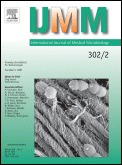
INTERNATIONAL JOURNAL OF MEDICAL MICROBIOLOGY
Innovating Solutions for Infectious DiseasesWelcome to the International Journal of Medical Microbiology, a leading publication in the field of microbiological research and infectious diseases, offered by Elsevier GmbH. Established in 2000, this esteemed journal provides a scholarly platform for the presentation of high-quality research, reviews, and innovations that bridge medical microbiology and clinical applications. With an impressive impact factor positioning it within the Q1 category across multiple disciplines, including Infectious Diseases, Microbiology, and Medicine, the journal is recognized for its rigorous peer-review process and significant contributions to advancing our understanding of microbial pathogenesis, diagnostics, and therapeutics. The International Journal of Medical Microbiology is committed to open access, promoting the dissemination of knowledge and accessibility for researchers, professionals, and students worldwide. Based in Munich, Germany, the journal continues to play a vital role in the global scientific community, fostering collaborations and inspiring future innovations in the fight against infectious diseases.

BRAZILIAN JOURNAL OF MICROBIOLOGY
Fostering Innovative Methodologies in Microbial ResearchThe BRAZILIAN JOURNAL OF MICROBIOLOGY, published by SPRINGER, stands as a pivotal platform in the field of microbiology, offering an open access model since 2000. With the ISSN 1517-8382 and E-ISSN 1678-4405, this esteemed journal encourages the dissemination of groundbreaking research and innovative methodologies that contribute to the understanding of microbial life, its role in health and disease, and its environmental impact. Based in Switzerland and accessible globally, the journal’s categorization in the Q3 quartile for Microbiology reflects its commitment to quality and relevance in the scientific community. As of 2023, it ranks 121 out of 182 in the Scopus listings for Microbiology, further highlighting its growing influence in immunology and microbiological research. With converged years spanning from 1992 to 2024, the journal continues to support a diverse range of studies, making it an invaluable resource for researchers, professionals, and students alike.
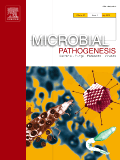
MICROBIAL PATHOGENESIS
Illuminating the Pathways of Infection and HealthMICROBIAL PATHOGENESIS, published by Academic Press Ltd - Elsevier Science Ltd, is a prominent journal in the fields of Infectious Diseases and Microbiology, with a notable impact factor and classified in the Q2 quartile for both categories as of 2023. Since its inception in 1986, this journal has provided a platform for the dissemination of cutting-edge research that enhances our understanding of microbial infections and their implications in health and disease. The journal is indexed in Scopus, ranking #80 among 344 in Infectious Diseases and #57 among 182 in Microbiology, underscoring its significant contribution to the scientific community. Although it operates under a traditional subscription model, the content is vital for researchers, professionals, and students focused on the dynamics of microbial pathogenesis and the development of innovative therapeutic strategies. The journal's comprehensive scope aims to foster advancements in this critical area of study, bridging the gap between laboratory research and clinical applications.

mSphere
Advancing microbial insights for a brighter tomorrow.mSphere is a leading open-access journal published by the American Society for Microbiology, dedicated to the dynamic fields of Microbiology and Molecular Biology. Since its inception in 2016, mSphere has rapidly established itself as a reputable source of scholarly research, achieving notable impact factors and excellence within the academic community. The journal ranks in the top quartile (Q1) amongst its peers in Microbiology, and Q2 in the field of Molecular Biology, demonstrating its significance and relevance through Scopus rankings—specifically, it holds the #42 spot out of 182 in the Microbiology category and #108 out of 410 in Molecular Biology. With an editorial commitment to advancing the understanding of microbial and molecular sciences, mSphere provides an accessible platform for researchers, professionals, and students alike to disseminate groundbreaking findings. The journal promotes rigorous peer-review and invites innovative contributions aimed at enhancing microbial research mobility and molecular exploration. Accessible openly since 2016, mSphere continues to thrive as an influential publication driving scientific dialogue and discovery in the microbiological sciences.
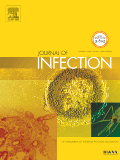
JOURNAL OF INFECTION
Pioneering Insights into Infectious ProcessesJOURNAL OF INFECTION is a premier academic publication in the fields of infectious diseases and medical microbiology, published by W B SAUNDERS CO LTD. With a profound impact factor and established since 1979, this journal serves as a crucial resource for researchers, clinicians, and policy-makers seeking to advance knowledge and understanding of infectious processes and their management. The JOURNAL OF INFECTION holds an impressive position in the academic hierarchy as reflected by its Q1 quartile rankings in both Infectious Diseases and Microbiology (medical) for 2023, further underscored by its Scopus rankings: #2 in Medical Microbiology and #5 in Medical Infectious Diseases, placing it in the 98th percentile overall. While the journal does not offer Open Access options, it provides a comprehensive outlet for innovative research, reviews, and clinical insights that drive the field forward. Published from the United Kingdom, it attracts a global readership keen on staying at the forefront of infectious disease research, making it an essential addition to any academic and clinical library.

TRENDS IN MICROBIOLOGY
Driving Progress in Medical Microbiology and VirologyTRENDS IN MICROBIOLOGY is a premier academic journal published by CELL PRESS, renowned for its high-impact research contributions in the fields of microbiology, infectious diseases, medical microbiology, and virology. With an impressive impact factor and a notable Scopus ranking—placing it in the top tiers of its categories, including a remarkable Q1 status in multiple disciplines—this journal is essential for researchers, professionals, and students aiming to stay at the forefront of innovative microbial research and ongoing advancements in pathogen biology. Since its inception in 1993, TRENDS IN MICROBIOLOGY has provided a platform for thought-provoking reviews and critical insights, fostering discussions that shape the future of the microbiological sciences. Based in the United Kingdom, TRENDS IN MICROBIOLOGY continues to lead the way in disseminating vital knowledge within the global scientific community.
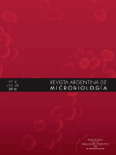
REVISTA ARGENTINA DE MICROBIOLOGIA
Exploring the frontiers of microbiology and medicine since 1979.REVISTA ARGENTINA DE MICROBIOLOGIA, published by the ASOCIACION ARGENTINA MICROBIOLOGIA, stands as a prominent open-access journal in the field of microbiology and medicine since its establishment in 1979. With an ISSN of 0325-7541 and an E-ISSN of 1851-7617, this journal has paved the way for disseminating high-quality research while enhancing accessibility for academics and practitioners worldwide. The journal has achieved notable rankings, being classified in Q3 for Medicine (miscellaneous) and Q3 for Medical Microbiology in 2023, reflecting its commitment to advancing knowledge in these critical areas. Despite its relatively modest impact factors, it occupies a vital niche in the academic landscape, fostering collaborations and innovative research among experts. With Open Access available since 2013, REVISTA ARGENTINA DE MICROBIOLOGIA not only facilitates widespread distribution of valuable scientific information but also empowers researchers, professionals, and students to stay abreast of the latest findings and developments in microbiology. For those engaged in the evolving realm of microbiology, this journal serves as an essential resource for sharing insights and advancing the scientific community.
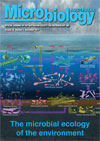
Microbiology Australia
Championing Open Access to Microbial DiscoveriesMicrobiology Australia is a prominent journal published by CSIRO PUBLISHING, focusing on the diverse and rapidly evolving field of microbiology. Since its transition to Open Access in 2021, it has broadened its accessibility, fostering greater dissemination of research findings among scholars and practitioners. The journal features a range of topics that are pivotal for understanding microbial systems in applied microbiology, medical microbiology, public health, and environmental applications. Despite its current categorization in the Q4 quartile across several categories, it remains an essential platform for emerging research and innovative methodologies. Researchers and professionals can benefit from the journal's commitment to enriching the global discourse on microbiological advancements. With its ISSN 1324-4272 and E-ISSN 2201-9189, Microbiology Australia caters to a wide audience in Australia and beyond, making significant strides in bridging the gap between research and practical applications in microbiology.